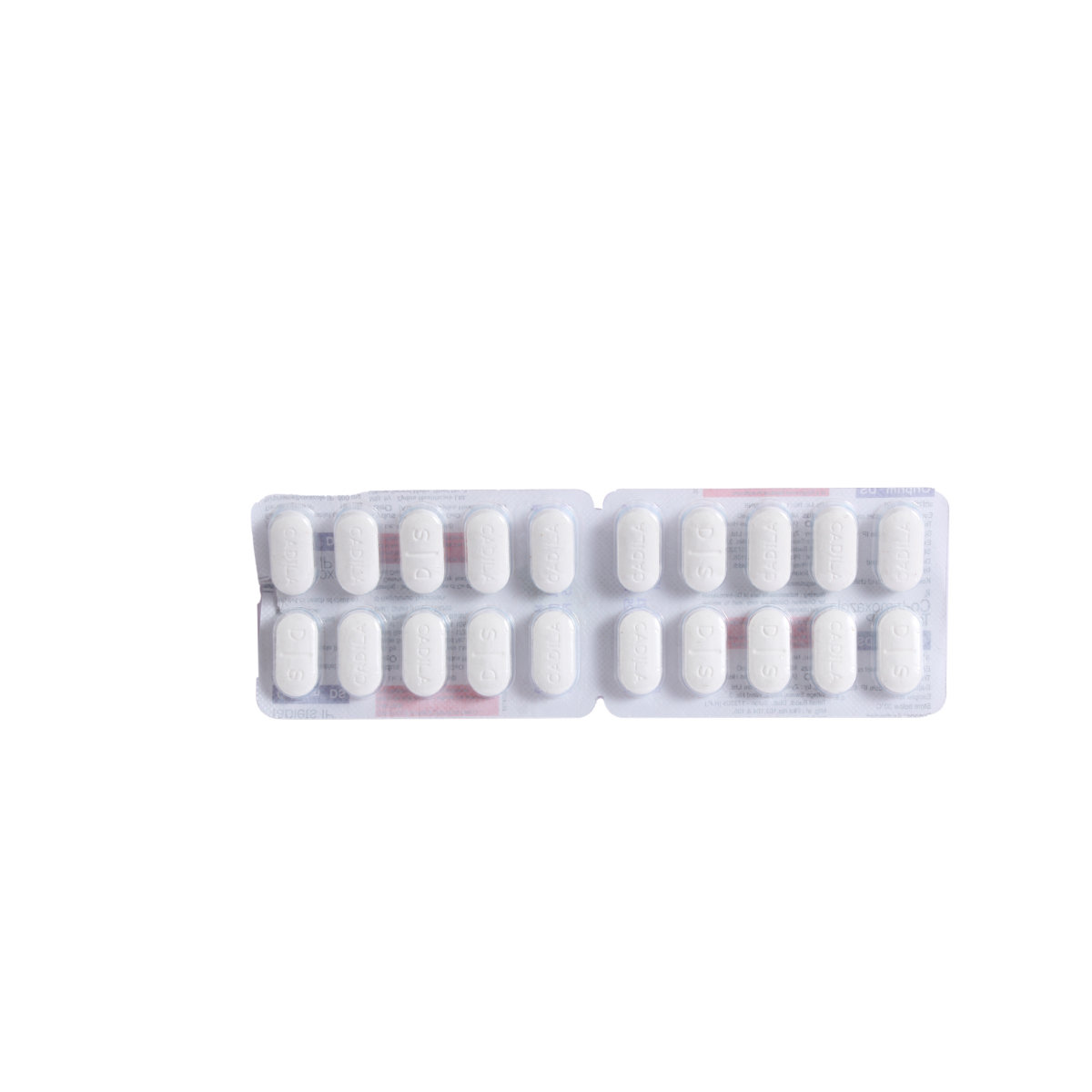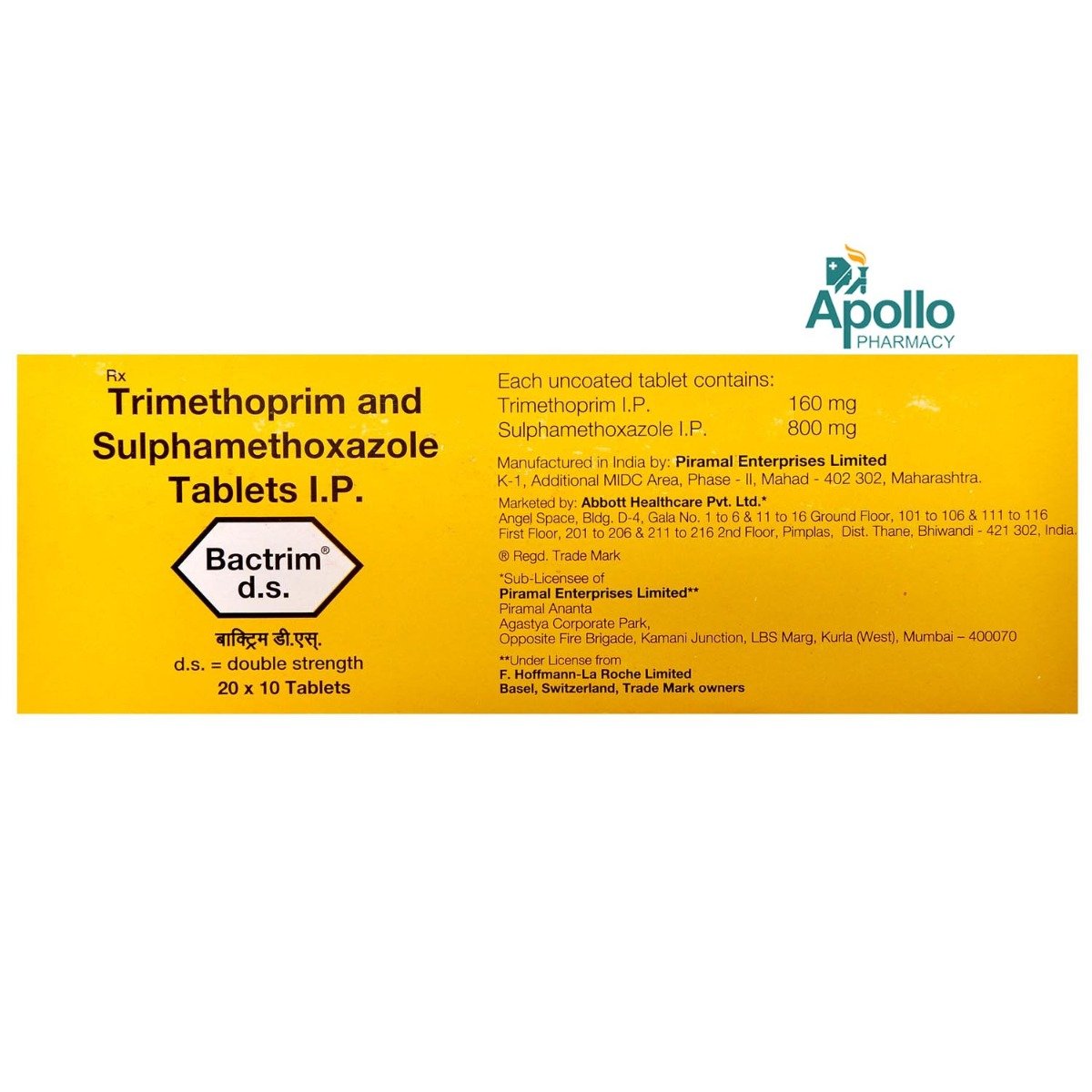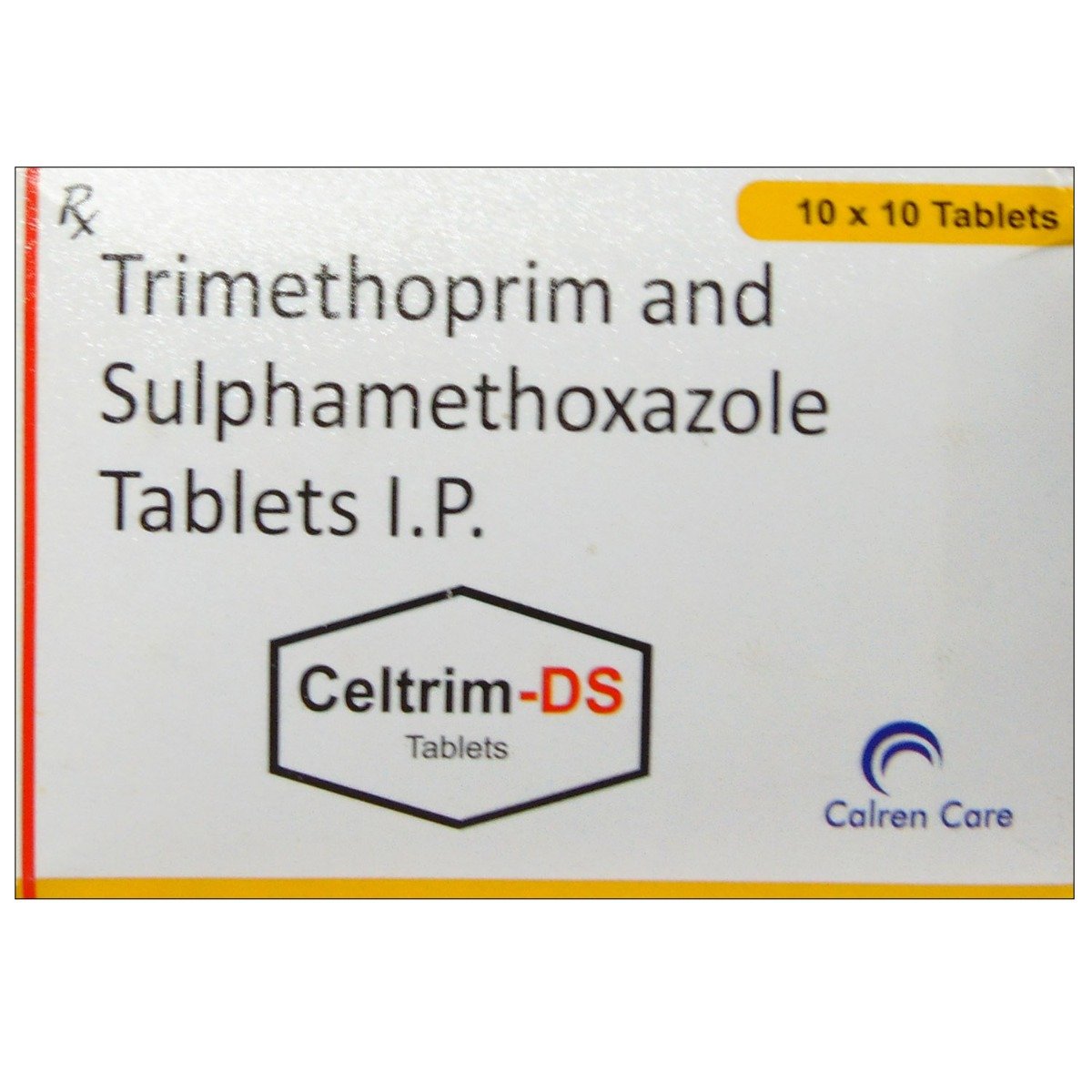Cosulf P DS 800mg/160mg Tablet
MRP ₹19
(Inclusive of all Taxes)
₹2.9 Cashback (15%)
Provide Delivery Location
Online payment accepted
 Prescription drug
Prescription drugWhats That
Composition :
Manufacturer/Marketer :
Consume Type :
Return Policy :
About Cosulf P DS 800mg/160mg Tablet
Cosulf P DS 800mg/160mg Tablet belongs to the group of medicines called ‘antibiotics’ used to treat bacterial infections of the urinary tract, respiratory tract (bronchitis), ear (otitis media), lungs (pneumonia), skin, brain and toxoplasmosis (infection caused by a bacteria called toxoplasma). Bacterial infections are caused due to the multiplication of harmful bacteria inside or on the body. Cosulf P DS 800mg/160mg Tablet does not work against infections caused by the virus, including cold and flu.
Cosulf P DS 800mg/160mg Tablet is a combination of two antibiotics, namely: Trimethoprim (folic acid inhibitors) and Sulfamethoxazole (sulfonamides). Trimethoprim prevents the formation of tetrahydrofolic acid, and sulfamethoxazole stops the bacteria from making dihydrofolic acid. Tetrahydrofolic acid and dihydrofolic acid are essential for the formation of proteins and nucleic acids, which are necessary for the survival of the bacteria. By inhibiting these, Cosulf P DS 800mg/160mg Tablet stops the growth of bacteria and kills them. Thereby, it helps to treat bacterial infections.
Your doctor will decide the dose and duration of Cosulf P DS 800mg/160mg Tablet based on your condition and the severity of the infection. In some cases, you may experience certain common side-effects such as high levels of potassium in the blood, palpitations (abnormal heartbeats), thrush or candidiasis (fungal infection), headache, nausea, diarrhoea, and skin rashes. Most of these side-effects do not require medical attention and resolve gradually over time. However, you are advised to talk to your doctor if you experience these side-effects persistently.
Before starting Cosulf P DS 800mg/160mg Tablet, please inform your doctor if you have any allergy (against any antibiotic), kidney or liver problems. Do not take Cosulf P DS 800mg/160mg Tablet on your own as self-medication may lead to antibiotic-resistance in which antibiotics fail to act against specific bacterial infections. Consult your doctor before taking Cosulf P DS 800mg/160mg Tablet if you are pregnant or breastfeeding. Avoid alcohol consumption to prevent unpleasant side-effects such as fast heartbeats, warmth or redness under your skin, tingly feeling, nausea, and vomiting. Cosulf P DS 800mg/160mg Tablet is not recommended for children below 12years.
Uses of Cosulf P DS 800mg/160mg Tablet
Directions for Use
Key Benefits
Cosulf P DS 800mg/160mg Tablet belongs to the group of medicines called ‘antibiotics’ used to treat various bacterial infections of the urinary tract, respiratory tract (bronchitis), ear (otitis media), lungs (pneumonia), skin, brain and toxoplasmosis (infection caused by a bacteria called toxoplasma). Cosulf P DS 800mg/160mg Tablet is a combination of two antibiotics, namely: Trimethoprim (folic acid inhibitors) and Sulfamethoxazole (sulfonamides). Trimethoprim prevents the formation of tetrahydrofolic acid, and sulfamethoxazole stops the bacteria from making dihydrofolic acid. Tetrahydrofolic acid and dihydrofolic acid are essential for the formation of proteins and nucleic acids, which are necessary for the survival of the bacteria. By inhibiting these, Cosulf P DS 800mg/160mg Tablet kills the bacteria and stops their growth. Thereby, it helps to treat bacterial infections. Cosulf P DS 800mg/160mg Tablet is a broad-spectrum antibiotic which is active against a wide range of gram-positive and gram-negative bacteria such as Streptococcus pneumonia, Escherichia coli, Klebsiella species, Enterobacter species, Haemophilus influenzae, etc.
Storage
Drug Warnings
Do not take Cosulf P DS 800mg/160mg Tablet if you are allergic to any of its contents; if you have severe liver or kidney problems, thrombocytopenia (low levels of platelets in the blood), or porphyria (rare blood problem). Consult your doctor immediately if you experience skin rash or prolonged, significant diarrhoea with abdominal pain. Talk to your doctor before taking Cosulf P DS 800mg/160mg Tablet if you have severe allergies, asthma, ulcers, blood disorders, thyroid dysfunction, diabetes, are elderly, underweight or malnourished; if you have a folic acid deficiency, glucose-6-phosphate dehydrogenase deficiency, or high levels of potassium in the blood. Consult your doctor if you are pregnant or breastfeeding. Avoid alcohol consumption while taking Cosulf P DS 800mg/160mg Tablet to prevent unpleasant side-effects such as fast heartbeats, warmth or redness under your skin, tingly feeling, nausea, and vomiting.
Diet & Lifestyle Advise
- Antibiotics can alter the useful bacteria in the stomach, which help in digestion. Therefore, you are advised to take foods rich in probiotics such as yoghurt/curd, kefir, sauerkraut, tempeh, kimchi, miso, kombucha, buttermilk, natto and cheese.
- Eat fibre rich food like whole grains, beans, lentils, berries, broccoli, peas and bananas.
- Avoid foods rich in calcium, grapefruit and grapefruit juice as they might hinder the absorption of antibiotics.
- Avoid consumption of alcohol and usage of tobacco.
Side Effects of Cosulf P DS 800mg/160mg Tablet
- High levels of potassium in the blood
- Palpitations (abnormal heartbeats)
- Thrush or candidiasis (fungal infection)
- Headache
- Nausea
- Diarrhoea
- Skin rashes
Habit Forming
Therapeutic Class
All Substitutes & Brand Comparisons
RX
Out of StockBactostab DS Tablet
₹11
(₹0.99 per unit)
42% CHEAPERRX
Out of StockCamiprim 800mg/160mg Tablet
₹12.5
(₹1.13 per unit)
33% CHEAPERRX
Out of StockDuocidal DS 800mg/160mg Tablet
Karnataka Antibiotics & Pharmaceuticals Ltd
₹12.8
(₹1.15 per unit)
32% CHEAPER
Author Details
We provide you with authentic, trustworthy and relevant information
FAQs
Drug-Drug Interactions Checker List
- GLIBENCLAMIDE
- AZITHROMYCIN
- METRONIDAZOLE
- ALBUTEROL
- BENDROFLUMETHIAZIDE
- GLICLAZIDE
Special Advise
- Cosulf P DS 800mg/160mg Tablet may affect certain laboratory test results such as blood tests. Inform the person doing the tests that you are taking Cosulf P DS 800mg/160mg Tablet.
- Your doctor may advise you to get regular tests if you have kidney problems or if you have been prescribed Cosulf P DS 800mg/160mg Tablet for a longer duration, to know if the medicine is working properly.
Disease/Condition Glossary
Bacterial infections: A bacterial infection is a condition in which harmful bacteria enter, multiply, and infect the body. Infectious or harmful bacteria can make you sick and reproduce quickly in the body. These harmful bacteria produce chemicals known as toxins, which can damage tissue and make you sick. Symptoms include fever, chills, and fatigue. Anyone can become infected with a bacterial infection. But, people with a weak immune system or taking immunosuppressive medicine are more prone to bacterial infection.

Have a query?
Alcohol
Safe if prescribed
Avoid alcohol consumption while taking Cosulf P DS 800mg/160mg Tablet to prevent unpleasant side-effects such as fast heartbeats, warmth or redness under your skin, tingly feeling, nausea, and vomiting.
Pregnancy
Consult your doctor
Please consult your doctor before taking Cosulf P DS 800mg/160mg Tablet if you are pregnant. Your doctor will prescribe Cosulf P DS 800mg/160mg Tablet only if the benefits outweigh the risks.
Breast Feeding
Consult your doctor
Please consult your doctor if you are breastfeeding, your doctor will prescribe Cosulf P DS 800mg/160mg Tablet only if the benefits outweigh the risks.
Driving
Safe if prescribed
It is unknown whether Cosulf P DS 800mg/160mg Tablet affects your ability to drive and operating machinery. Drive only if you are physically stable and mentally focussed.
Liver
Consult your doctor
Please consult your doctor before taking Cosulf P DS 800mg/160mg Tablet if you have liver impairment/liver disease. Your doctor will weigh the benefits and any potential risks before prescribing it to you.
Kidney
Consult your doctor
Cosulf P DS 800mg/160mg Tablet to be taken with caution, especially if you have a history of kidney impairment/kidney disease. The dose may have to be adjusted by your doctor.
Children
Safe if prescribed
Cosulf P DS 800mg/160mg Tablet is not recommended for children below 12 years.









_0.jpg?tr=q-85)

